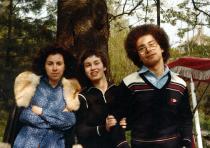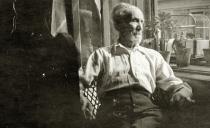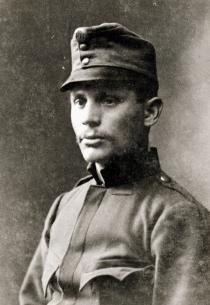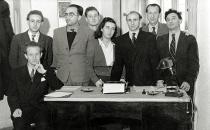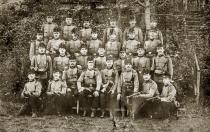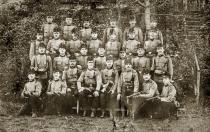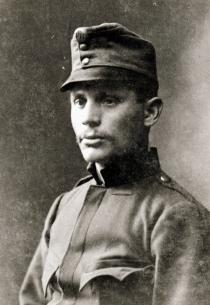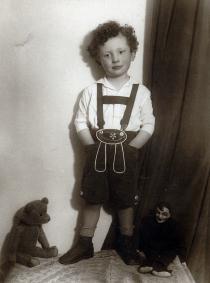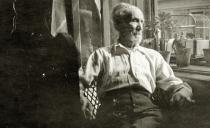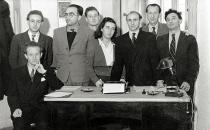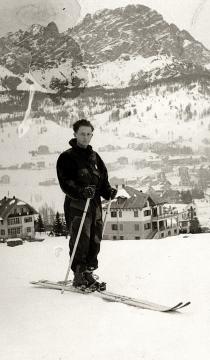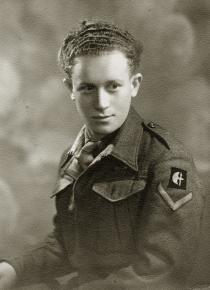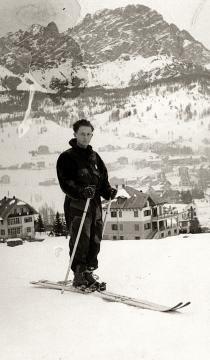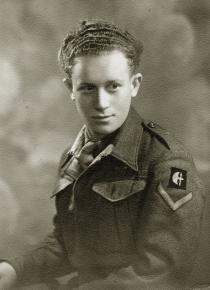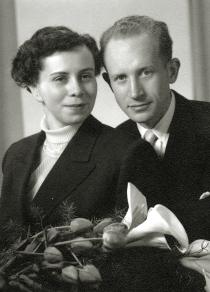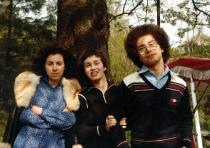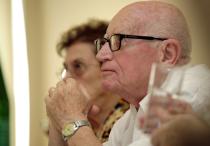
Otto Suschny
Vienna
Austria
Date of interview: August 2002
Name of interviewer: Tanja Eckstein
Dr. Otto Suschny is a very nice, humble man, who lives with his wife, Kitty, in a marvelous art noveau villa in the 14th district. He likes telling me about his life and is willing to lend me his support in an advisory capacity after the interview.
My Family History
I don’t know anything about my great-grandparents.
My grandfather on my father’s side was called Simon Suschny. He was born in Moravia, in Gross-Meseritsch, on January 6th, 1850. My grandmother Cilli, born Fischer, died very young. Grandfather then married Rosalia Fischer, who they called Sali. I assume she was my grandmother’s sister. She also died before my birth. My grandfather worked at the train station, most likely the North Station in Vienna. He was a porter, a kind of luggage carrier. I knew him very well, since he lived until around 1936.
In both my mother’s and father’s families there were four daughters and a son. My father, Siegfried Suschny, was born in Vienna on October 7th, 1887. He had four sisters: Ida, Rosalie, Malwine, and Adele.
Aunt Ida was born on March 20th, 1890. She had a daughter out of wedlock; her name was Frieda and she was ten years older than me. She worked as a saleswoman at Herzmansky [a large department store] on Mariahilfer-Strasse [a well-know shopping boulevard in Vienna]. In the early 1940s, after she had already immigrated to Palestine, Aunt Ida married Oskar Hein [Ida and Oskar Hein were murdered on June 15th, 1942 in Maly Trostinec. Source: DÖW Database]. Frieda immigrated to England and died in 1989.
Aunt Rosalie died before the 2nd World War.
Aunt Malwine, the eldest sister, was married to the carpenter Israel Karminski. They had three children: Hedda, Otto, and Mella. They lived in a council home in the 15th district. Hedda later married Heinrich Mikolasek. They all survived the war in England.
Aunt Adele, the daughter of my grandfather’s second wife, was a seamstress. She was married to Willy Kollarek. It wasn’t a happy marriage and they got divorced. Men found Aunt Adele very attractive so she was never alone for long. She survived the war in England.
My grandfather Simon Suschny prayed in a small prayer house on Karajan-Gasse [20th district]. During Sukkot, a sukkah was always constructed the courtyard between houses 8 and 10, in which the religious among the many Jews living in these buildings could pray.
My father’s and my mother’s families lived on Raucher-Strasse [20th district], in buildings across from one another: One family in building number 9, the other in house 10. As a young man my father regularly visited my mother’s mother – my maternal grandmother. Young people often met up there. I don’t know if my parents had met each other somewhere else before, or of it was there for the first time.
My grandparents on my mother’s side were both from Moravia, and at least one of them was from a little place called Gewitsch. Their names were Leopold and Regine Schafer. Regina’s maiden name was Kaufmann. She died in 1936. Grandfather was a soap maker and had a business. It was a small workshop on Engerth-Strasse [20th disctrict] in Vienna. They had another branch, also on Engerth-Strasse, near Allerheiligen-Platz. My grandfather probably worked in this shop himself, but I can’t really remember him. He died in the early 1930s; I was five or six years old then.
My mother had four siblings: a brother and three sisters. My mother, Adele Suschny, born Schafer, was born in Vienna on September 16th 1893. Her siblings were called Maximilian, Hannah, Irma, and Paula.
Maximilian, Max, was born in Vienna on April 15th 1889. He married Leonore and they didn’t have any children [Max and Leonore Schafer were deported on February 19th, 1941 to Kielce and murdered. Source: DÖW Database]
Hannah Schafer was born in Vienna on December 15th, 1887. She wasn’t married [Johanna Schafer was deported on October 28th, 1941 to the Lodz Ghetto and murdered].
Irma Schafer was born in Vienna on November 22nd, 1890. She was the youngest sister and worked in grandparent’s shop [Irma Schafer was deported on October 28th, 1941 to the Lodz Ghetto and murdered. Source: DÖW Database].
Paula Schafter was born in Vienna and was married to the accountant Siegmund Weihs. They had two sons: Gustav and Ernst. Ernst is the only one to survive the war. Gustav died during an illegal transport in Sabac, in Yugoslavia. My cousin Ernst lives with his wife in England. He is about two years older than me. I will be 78 in the next few days and he is 80. He immigrated to Israel and from there to Australia. He worked on a ship and eventually reached England.
There was a perfumery and a hardware store connected to my grandparent’s shop. That was a basement location with workshop rooms at Engerth-Srasse 106. There was a boiler room with a large boiler for cooking the soap, a storeroom, and a room with machines for the extrusion press and the stamps for the fabrication of soaps that were made by embossing. Earlier they had made candles there, but they had already given that up by the time I was born. Business wasn’t doing very well. The times that I can remember, Uncle Max stood in the shop and led the business; in the early days it was with Aunt Hannah, my mother’s oldest sister, who was also active in sales.
In order to procure the essential capital needed to modernize the machines, my Uncle Max married my eventual Aunt Leonore. I don’t remember anymore what her maiden name was. They were able to purchase a few machines from the dowry, but that was already in the mid-1930s and didn’t help much. The business survived until 1938. Then it was closed by the Nazis and set for liquidation. The machines were carried off to Germany. Today there is a pizzeria where the shop used to be.
We also had a Rabbi in the family. His name was Siegmund Jelinek and was my mother’s uncle. He was a Rabbi in Hollabrunn and had two sons: Siegfried and Hugo. One was a lawyer; I don’t know what the other one was.
My grandmother had a relative with a stamp shop on Klosterneuburger-Strasse. That was very interesting for me because sometimes he gave me old stamps. These were the start of my stamp collection back then.
My family worked in the 20th district on Rauscher-Strasse. Only Aunt Malwine lived with her family in the 15th district.
My Childhood
I am an only child. My parents were married in 1920 and I came into the world on August 28th, 1924 in Vienna.
I had to go to nursery school and I hated it. I didn’t get along with the other children. I was small, had red hair, and they would tease me. Back then, that was a reason to ridicule someone.
I went to elementary school on Wasner-gasse, near the Augarten [Park; Vienna’s oldest baroque garden]. Neither the nursery nor the elementary schools were Jewish institutions. They were normal, public establishments.
Anti-Semitism certainly played a roll at elementary school. There was some trouble in this regard, and, as a Jew, I was a bit bothered. But I remember I was insulted much more because of my red hair and because I was small and not very strong. For a long time I couldn’t defend myself. Once, when my best friend, who sat behind me, pushed me, causing me to smudge my notebook, I was so angry that I turned around and jabbed him the thigh with an ink pen. That was quite the scandal, of course. But it turned out to be very beneficial, since he left me alone after that. After that I was considered unpredictable.
Grandmother and Grandfather Schafer were devout. My grandfather died in the early 1930s and my grandmother lived with her unmarried children Hannah, Irma, and Max in an apartment on the same hall as ours. Max got married later.
Evenings we were often at my grandmother’s and ate supper there together. I only liked poultry meat, Germknödel, Zwetschkenknödel [yeast dumplings filled with plum sauce], pancakes, and such things. My grandmother and my parents always bought a goose together for the holidays, which was always prepared in my grandmother’s apartment. The giblets were always eaten first, then the cooked meat. For a long time after we would be eating the leftover goose-lard and the liver set in preserving jars. On Shabbat [the seventh day of the week, day of rest] my grandmother would light the candles and pray.
My parents weren’t religious anymore. They didn’t even go to temple for the holidays. My father left the religion when I was six years old in order to keep me from receiving religious instruction. He was then unaffiliated with any religion, and so I was unaffiliated. He registered that with the district authority. I don’t know if you also had to register that with the religious community, or only with the district authority and it would be automatically passed on. In any case he left and I was then considered unaffiliated. For the first four years of elementary school I didn’t have any religion lessons.
We didn’t have much money; we couldn’t afford to go to the opera. My father was a sales representative for perfumes and during the looming economic crisis he was unemployed for many years. From time to time he would help my uncle at the soap manufacturers. My mother made ends meet with sewing work.
My father was wounded as a soldier in the 1st World War. He was in this Battle of the Piave River. I think he was wounded in Piave. He had been shot through the lung. There he became a communist and became a member of the Communist Party, which was later illegal. I know that we cooked the paste for hanging posters at home. My mother was a bit disgruntled by it, but didn’t interfere.
We celebrated neither Christmas nor Chanukah. I only received gifts for my birthday. Our neighbors had a Christmas tree and I always went over there to look at it. When I was still very little, a resident of our building dressed up as Krampus [horned figure that punishes children around Christmas time] and another dressed up as Santa Claus. The Krampus went to all the children in the building and brought them Krampus presents. I cried a lot when they passed our apartment. My father then went out to talk to the people, and afterwards they always came to me, too.
My parents couldn’t afford vacation. Twice I was sent to a farm. Once I spent my summer with my Cousin Mella in Neutal in Burgenland. We often accompanied the farmers on the fields and I can remember the wonderful meals: Strudel with apples, cherries, or Strudel filled with cabbage. The following summer I was with my Cousin Ernst, also in Neutal, but with different farmers.
My School Years
In 1934, at the instigation of my mother, I went to the Realgymnasium [secondary school with an emphasis on science] RG 20 on Unterberg-Gasse. My father didn’t know if he should really let me go to this school. He said that all Jews go to high school – which is middle class. But he cared about me a lot and we had a good relationship. He allowed himself to be persuaded, as my mother and I insisted on it.
At school I was in an almost Jewish class; there were only a few non-Jewish classmates. So they knew better than to attack us. There wasn’t a single one who dared make an anti-Semitic comment.
The Latin teacher –Nicetas Draxler he was called – supposedly became a horrible Nazi. I heard about that after the war. My class teacher, our math teacher, who encouraged me and with whom I had a good understanding, was supposedly an illegal Nazi. I learned that after the war as well. I never knowingly witnessed that. He never made any comments to me in this direction, rather the opposite: I once got a bad grade for my schoolwork in math, which seldom happened. I was one of the best in math. When he returned my notebook to me, he said, “It hurts my soul to see you in this company.” He was strict, but fair: we all appreciated him. Our geography and history teacher, Illichmann, was less popular. I would have figured him to be a Nazi. My later brother-in-law met him in an internment camp in England – the teacher had a Jewish wife.
In 1934 the Christian Socialist Party effected a decree that every child must participate in religion lessons. The classes were separated by gender and religion. There were two classes with boys, since more boys than girls went to the Realgymnasium back then. One class was a purely Catholic class. The other class was made up of 80 to 90 percent Jewish children, and included the Old Catholics, evangelical students, and unaffiliated students. I was in this class as an unaffiliated student. Girls were in a third class where the religions were mixed.
After the new law I could pick which religion class I wanted. I chose the Jewish religion class. I found the lessons very interesting. We had a really good religion teacher, Prof. Leo Menscher he was called. He designed the class very well. Later he went to Israel. He made a great effort with me, since to him I was a kind of “lost sheep.” He asked questions about Jewish history to allow us to develop things ourselves. I found Jewish history and the interpretations of the bible texts fascinating. We also went to the Klucky Temple [20th district] for afternoon services. I was less interested in the Hebrew language. For me it was just another language that you had to learn.
For my father, religion was opium for the people, but he accepted me, of course. When my classmates had their Bar Mitzvahs, I was often invited to their parties. There was music, games, and a lot to eat; they also recited poems. I always had to recite “Des Schadchens Fluch” – a parody in Yiddish of “Des Sängers Fluch” by Ludwig Uhland [1787-1862]. I can still do it today. I wanted to have a Bar Mitzvah and was prepared to learn everything I had to. But I postponed the date of the related Torah reading [The five books of Moses] to a week with an especially short haftarah [reading from the books of the prophets following the Torah reading].
My parents had non-Jewish and Jewish friends. I think there were more Jewish friends. But they didn’t actually draw any distinctions. I didn’t draw any distinctions amongst my friends either. In the 1930s my father tried his luck in the Soviet Union, partly because of unemployment, partly for political reasons. He went to Moscow for a few months and worked there. But he needed to sublet an apartment and wanted to make good for us. When he returned, he spoke very little of his experiences in the Soviet Union. I think he was disappointed. I was too young back then to really ask. At that time I was also inspired by communist ideals; I went to the May demonstrations and was with the Pioneers at the communist youth organization. I went to two summer camps. One was in Czechoslovakia. I don’t know anymore where the other was. They were disbanded by the police at some point. In those days I could have never imagined that things in the Soviet Union might not have been for the best.
The War Begins
Everyone knows about the population’s rejoicing of the “Anschlus,” the Nazis that emerged everywhere, and the actions against dissidents and Jews. Stateless Jews and Jewish people with Polish citizenship were locked up in a former primary school on Karajan-Gasse in our district. From there, some of them were sent to a concentration camp.
It wasn’t easy to emigrate. You needed to find a country that was ready to take in Jews and you needed to get a travel permit from the German authorities.
I can’t remember the neighbors in our house being anti-Semitic. Sometimes I was taunted by hooligans on the street. I certainly didn’t look very Jewish, but maybe just a little bit. After 1938 that became critical. Even adults were dangerous then. We didn’t experience the 10th of November 1938 first-hand – no one came to us. No one in my family was locked up. Of course we were aware of what was happening to other people who were locked up and beaten.
I once had a strange experience: before a friend, a former classmate from Vienna, emigrated, he gave me books. When I arrived home with the books, two men were standing at the gate to our house; one of them was an SA man. I must have looked Jewish after all, because the SA man immediately recognized me as a Jew. He looked at the books and asked where I was going. Then he slapped me in the face. That was the only time I was hit by an adult as a Jew. I had to take him into our apartment. He wanted my father to show him our books. My father had a couple of volumes of Friedrich Schiller and the SA man said, “What does a Jew need Schiller for?” Then he asked if we had money in the house. My father asked him how much money he thought an unemployed person had and showed him the little money there was. The SA man didn’t touch the money, but he took the Schiller with him. It was all a bit bizarre.
Our living situation was not pleasant; it bothered us. But we didn’t know about the mortal danger yet. Who could have even imagined that? If my parents had sensed the danger, they would have left everything behind and tried to flee. There were people selling tickets to Shanghai. But you needed a lot of money for that and we only had a little bit. Besides which, at that time my parents thought you could somehow withstand everything.
My Cousin Ernst and I applied at the Palestinian Authority [The Palestinian Authority ran the entries to Palestine and certificates for youth Aliyah and was located on Marc-Aurel-Strasse in the 1st district]. Many Jews attended so-called retraining courses and language courses in order acquire skills for life in another country. For months my Uncle Max ran a course on behalf of the religious community that I was allowed to assist him with. Some lawyers and professors want to learn soap-making, perfumery, and shoe polish production. I was there as apprentice lad. I helped out and learned some things as well. I had printed instructions about how to make things. I took the instructions with me to Palestine.
That was in 1939. My father was no longer in Vienna. He was doing forced labor in Germany for a while, came back, and then was on this Nisko transport. Many who were there fled to the Soviet Union. My father didn’t want to flee because of the family and came back to Vienna.
My Aliyah
At this time I was in preparation camps for youth Aliyah. The second camp was in Moosbrunn, and from Moosbrunn I was called for Aliyah. In fall of 1939 I came back to Vienna and on November 9th, 1939 I was on a legal route through Italy with a certificate to Palestine. I could only say goodbye to my mother. I was expecting my parents to follow.
My father came back to Vienna from Poland and I learned later that my parents were deported to Maly Trostinec [Belarus] on August 17th, 1942 and murdered on August 21st, 1942. They were killed immediately, which is a relief. They were at least spared the camp.
It was already wartime, but Italy wasn’t fighting yet. There was no English Consulate in Vienna and Palestine was a British Mandate. So we needed to get an Italian transit visa before getting a final visa for Palestine stamped in our passports. We stayed in Trieste for a week. During this time out passports were sent to the English Consulate in Rome, where they stamped the visas into them. Then we could board a ship. There were two sister ships, the “Galileo” and the “Jerusalem.” I was on the “Galileo.”
More refugees came after me, but the majority wasn’t from Vienna. From our group a few had been sent to Denmark and then to Holland, where they could then continue on to Palestine.
I was in a Kibbutz for two years that was moderately Social Democratic. I belonged to the youth group. First there was an assembly where they discussed who was to do what jobs. The preferred object was farming. I didn’t have much interest in it; I wanted to learn something artisanal and signed up for carpentry. That wasn’t so easy since there was only one spot. Another person also wanted carpentry, so we drew lots. I was lucky and fate picked me. The other person was to relieve me after a year. I don’t know any more if that ever happened. In any case I stayed with carpentry the whole time.
We had class in the morning and in the afternoon we worked. If there was important work to get done, you could also switch. Then we had a full day Yom Oved [work day] and a full day Yom Limud [learning day]. Communism influenced me even more on the Kibbutz. Someone from outside the Kibbutz came to promote the Communist Youth; a small communist cell also existed.
I didn’t want to stay on the Kibbutz. I took a vacation and went to Tel Aviv. My problem was that I didn’t have an apartment. I needed work and an apartment. I was lucky, since someone offered me a job in a hotel.
When I got to Tel Aviv I was supposed to live at friend’s first, but I didn’t have the exact address. I didn’t find my friend. In the evening I lay down on a bench to sleep. A police officer routed me out and I spent the night at the police station. Then I met another friend who told me that he’d been offered a job in a hotel that he didn’t want to take. It was a good offer since it came with possible accommodations: lodgings and food – that was the main problem. The pay wasn’t especially good, but I took the work. I was at the hotel for a couple of months. Then I read an announcement in the newspaper for a specialist in soap-making. Of course I was everything but a specialist in soap-making.
I had the gall to apply there as a specialist and I succeeded in making soap flakes. The owner of the soap factory didn’t understand anything and I didn’t understand enough. He counted on my being a specialist, and of course that couldn’t work.
He liked the soap flakes, but then he wanted toilet soap. I couldn’t manage that. Afterwards I went back to Tel Aviv and took a position picking oranges and clearing weeds in orange groves, known as Pardess.
I barely had any money back then and had to live on bread and oranges. For years after I returned to Vienna I couldn’t even look at an orange. Then I got a job as a laborer at the locksmith’s in a military camp. In Vienna I’d also done a retraining course with a Jewish locksmith near Karlsplatz. I now wanted to be taken on as a locksmith’s apprentice. In Israel I met the locksmith from my course at Karlsplatz again. He was working there as a locksmith and advised me to work as a laborer, as I could get more money that way. As an apprentice I would have earned next to nothing. Then I was a laborer for a few months. Then I was an auxiliary policeman for a year.
As an English Soldier in Italy
I spent my annual vacation with a friend and we stayed a few extra days. Then I immediately reported to the military. That was desertion, but since I was now in the military, they didn’t take it so seriously.
I was in the military, the RASC , that’s the Royal Army Service Corps, for three and a half years. I learned to drive three-ton trucks. We had a training course first. I had attended an English course at the Kibbutz. Each one of us there had something he thought he could teach. I taught math. I taught myself English. I had a very interesting English book. At first I read it with a dictionary, then I put the dictionary away and just read further. That’s how I taught myself English, which didn’t do much good for my pronunciation. But I had a large vocabulary. In Sarafend, near Tel Aviv, there weren’t that many who could speak sufficient English. That’s how I earned the first stripes on my uniform.
From Sarafend I was transferred to an RASC transit camp in Taranto, Italy. There I was classified into the 462nd Company – that was a Jewish company but not the “Jewish Brigade.” I served there until the end of the war. I was Turin when the war ended.
The soldiers shot light munitions into the air and yelled, “The war is over, we won the war!” Japan was still in the war but it was over with Germany. I then applied to the “interpreter’s pool” because I wanted to go back to Austria and find out what happened to my parents. I learned a little Italian in Italy. But I couldn’t speak it well enough to say in good conscience that I know Italian. But apparently it was sufficient – I became an interpreter for German and Italian. I was in Carinthia for a start. After leaving Italy I was no longer in a Jewish unit, but with the English forces, usually as the only Jew.
Because I had indicated that I could speak Italian, I was sent back to Italy. I was sent to a war criminal’s prison in Rome. There I interpreted for the administration. I didn’t enjoy that, as I wanted to stay in Austria. I was in Vienna once in the meantime and determined that my parents weren’t there anymore. But I wanted to study in Austria. Then, finally, I was transferred to Austria.
Back to Austria
We were happy! The Nazis were gone and Austria was a free country. In Israel I was also with the “Free Austrian Movement.” We wanted to set up something new in Austria.
In the military I did the English school leaving qualification. I had already begun a qualification exam course in Israel. I had my aunt, who was in England, send me books and I studied for the A-Levels. The English military school leaving qualification was then relatively easy.
In Vienna I received a scholarship and had also saved money. For every month in the military you received a little money. I had it paid out to me in England and then sent to Vienna. I could live off of that for a year. But I immediately looked for a job in addition.
My wife, Kitty Suschny, born Pistol, had a brother, Harry Pistol, who was also in the English military. Kitty was born in Vienna on November 25th, 1924 and was saved with a Kindertransport to England.
For Passover [festival to commemorate the exodus of the Jews from Egypt] in 1947, the Americans invited all the Jewish soldiers of the Allied Armies in Vienna, and those already released, for a Passover celebration in Café Beethoven. The brother of my eventual wife registered himself and his sister. We encountered each other there for the first time. On the first evening she was at the table with an American who was interested in her, and I was with an English woman. Neither the English woman nor the American were there the next night, so suddenly we were sitting next to each other and began talking.
I was never in the Communist Party. I was in the “Democratic Students’ Union.” That was a communist camouflage organization; the leaders were all communists. I was a member there for a while, but wasn’t going to the Communist Youth any longer. One day I met a friend. We were already friends as children, and our mothers were also friends. He had been working at the Jewish-Historical Documentation. Officially it concerned itself with documentation; unofficially they were hunting war criminals. We gathered witness statements from people who were in ghettos in Poland or in the camps, and who could report on the people who had murdered Jews, or who had helped to murder Jews. The work was extremely important and I liked doing it. Because of these statements, dozens of Austrian police officers were arrested. This was still the time of the occupying powers; the Russians demanded the extradition of war criminals that they then brought to Russia. Unfortunately a few of them returned, but they had at least undergone something in the Russian camps.
Tadek Frydman was the head of this organization. In total we brought 50 to 100 people behind bars. Unfortunately not for good, but for some time at least.
Back then the communist, Heinrich Dürmazer, was the chief of the State Police. Then the social democrat, Peterlunger, was chief and nothing worked anymore. We couldn’t reasonably pursue our work. We then compiled a sort of documentation about the Jews in Austria. I was less interested in that; we weren’t historians. I felt very amateurish.
My New Life
Afterwards I studied chemistry and finished with a doctorate. Kitty and I were friends for seven years. We married one week after I finished my doctorate.
For a short time I was the private assistant for Professor Broda, with whom I wrote my dissertation. His grandfather was Jewish and he was in England during the war. Starting in 1954 I had a job in the armory as an auditor.
My wife and I ran a small textile shop on the side that only my wife stood inside of.
I distanced myself more and more from the Communist Party line. And I had even more to think about in 1956 when the revolution in Hungary was quelled by military intervention from Soviet defense forces. I signed against military build-up, but I wasn’t true to party principles, I never really was. Only at the start, when I didn’t know any better. From the moment I could think a bit more for myself, I was everything but true to the party line.
In 1957 the International Atomic Energy Agency came to Vienna. I applied there and was hired. For the next 26 years I was working for the International Atomic Energy Agency. That was my dream job. The work was interesting and it was a comfortable work environment. I could take many trips and I was paid well. I had everything you could wish for in a job. I stayed there until retirement.
In 1957 our daughter Eva-Ruth, married Dombrowski, was born. She is the only one of our three children who consciously lives Jewish, therefore traditionally, with her family. In her youth she was in Israel for half a year. She then studied medicine in Vienna and works as a doctor. She has three children: Daliah, Sonja, and Raphael. The children go to Jewish religion lessons. My daughter’s mother-in-law is also not pious, but she celebrates the Seder [the evening before Passover] with the children.
In 1960 our daughter Dinah, married Nemesszegy, was born. She is a medical-technical employee. She has a son named Joachim.
In 1962 our son Peter was born. He is a conscious Jew, but doesn’t live accordingly. He is self-employed, married, and has a son, Martin, and a daughter, Yvonne.
There were a few reasons why I came back to Austria. First, I thought I would still find my parents here. Later, I thought that with the Nazis gone, the country would develop democratically. Of course I didn’t know that there were still a lot of Nazis, more than is good for a country. But there were democratic organizations that seemed to more or less function.
During the Waldheim-Affair I felt awful because so much anti-Semitism came to the surface. I think of Waldhiem more as a senseless liar than as a Nazi. But at the time I didn’t feel like I was living in a Nazi country. I couldn’t live here if, at the outset, I saw a Nazi in every person. Then you couldn’t live anywhere except for Israel and I would have enough problems there. I don’t believe in collective guilt, that’s absurd.
